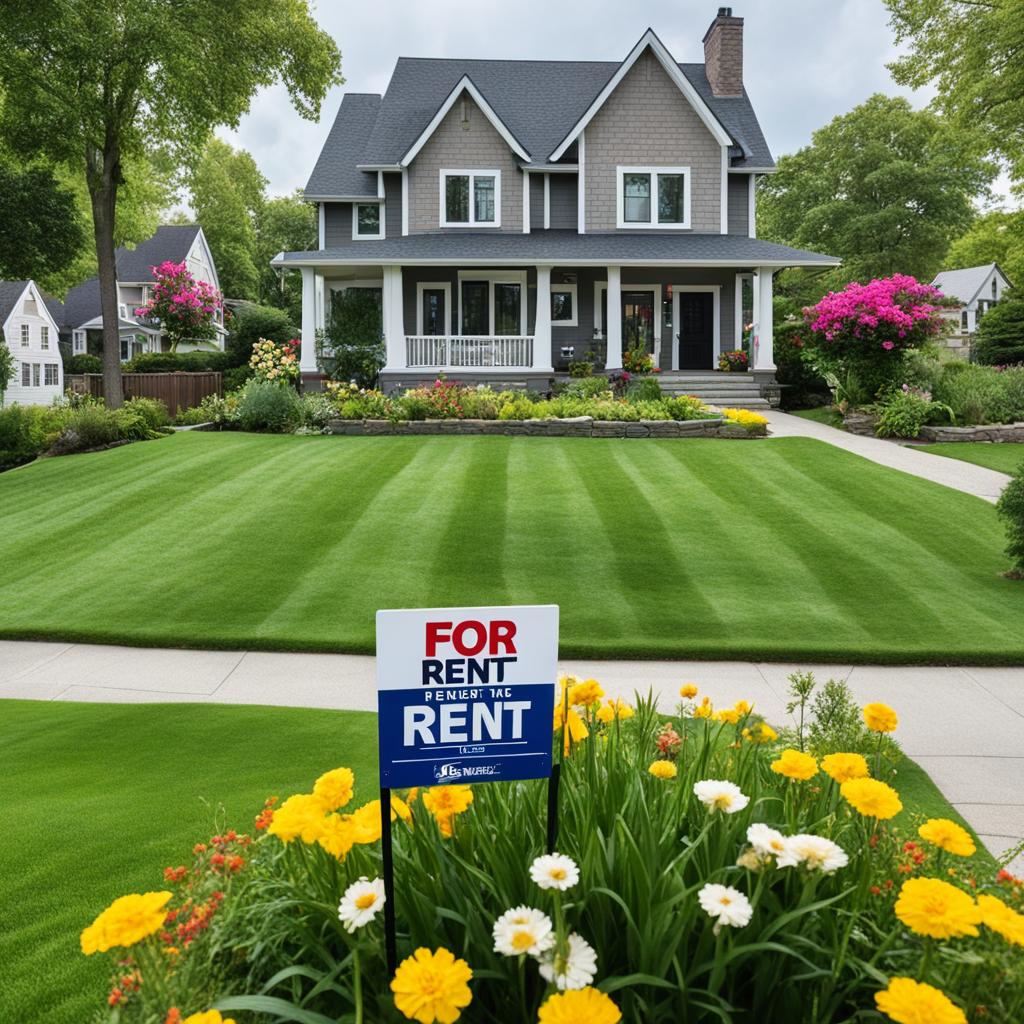Are you wondering how much you can rent your house for? Determining the right rental price for your property can be a challenging task. It requires careful consideration of various factors, such as the house’s value, market trends, comparable properties, and your financial goals. But don’t worry, I’m here to provide you with expert rental valuation tips to help you maximize the income potential of your rental property.
Key Takeaways:
- Consider the value of your house, market trends, comparable properties, and financial goals when determining the rental price.
- Expert rental valuation tips can help you maximize the income potential of your rental property.
- Factors such as house rental rates, rental property valuation, and determining rental price play a crucial role in setting a competitive rental price.
- Understanding the rental property market analysis, rental property income potential, and rental property return on investment will help you make informed decisions.
- By following expert tips, you can ensure a fair and competitive rental price for your house.
Should I Sell or Rent My House Out? Key Factors to Help You Decide
When you find yourself in the position to decide whether to sell or rent your house, it’s essential to consider several key factors that will influence your decision. Evaluating these factors will help you make an informed choice that aligns with your financial goals and priorities.
Financial Goals and Monthly Revenue Potential
One of the crucial factors to consider is your financial goals. Evaluate whether you need immediate access to a lump sum of money or if you are looking to generate a consistent monthly income. Selling your house will provide you with a substantial amount of money upfront, while renting it out can create a regular stream of rental income.
Asset Appreciation and Real Estate Market Conditions
Asset appreciation is another aspect to contemplate. Research the historical and projected real estate market conditions in your area. If the market is expected to appreciate significantly in the coming years, holding onto your property may lead to a higher return on investment in the long run. However, if the market is stagnant or declining, selling your house now might be a more favorable option.
The Pros and Cons of Renting vs. Selling
Pros of Renting
- Regular rental income
- Opportunity for property appreciation
- Flexibility to sell in the future
Cons of Renting
- Responsibility for property maintenance
- Potential difficulties with problematic tenants
- Market fluctuations can affect rental demand
Pros of Selling
- Immediate access to a lump sum of money
- Elimination of ongoing property management responsibilities
- Freedom from market risks and uncertainties
Cons of Selling
- Missed opportunity for rental income
- Loss of potential property appreciation
- May need to pay capital gains tax
By carefully weighing the pros and cons of each option, you can evaluate which factors are most important to you and make an informed decision that aligns with your individual circumstances.
How to Successfully Rent Your House: A Step-by-Step Guide
Renting out a house requires careful planning and execution. To ensure a smooth renting experience, follow these step-by-step guidelines:
Step 1: Finding Tenants
In order to rent your house, you need to find reliable and responsible tenants. Start by:
- Advertising your property: Use online platforms, local newspapers, or social media to reach potential tenants.
- Screening applicants: Conduct background and credit checks to ensure the suitability of potential tenants.
- Checking references: Contact previous landlords to gather information about the applicants’ renting history and behavior.
Step 2: Setting up Rental Agreements
Once you find suitable tenants, it’s important to establish a clear and legally binding rental agreement. Consider hiring a lawyer or using a trusted online service to:
- Create a comprehensive rental contract that outlines the terms and conditions of the tenancy, including rent amount, payment schedule, and lease duration.
- Include clauses that protect your rights as the landlord and address potential issues such as property maintenance and tenant responsibilities.
Step 3: Marketing Your Property
Effectively marketing your rental property can help attract potential tenants. Consider:
- Creating a compelling listing: Highlight the unique features and amenities of your house to make it stand out.
- Using high-quality photos: Capture attractive images of the property to showcase its appeal.
- Utilizing online platforms: List your property on popular rental websites and social media platforms to reach a wider audience.
Step 4: Conducting Screenings
Thoroughly screening potential tenants is crucial to select reliable individuals who will take care of your property. Consider:
- Verifying income and employment: Request proof of income, such as pay stubs or employment contracts, to ensure tenants can afford the rent.
- Checking rental history: Contact previous landlords to gather insights on the applicants’ rental behavior and reliability.
- Conducting interviews: Meet potential tenants to assess their personality and communication skills.
Step 5: Rental Property Management
Managing your rental property efficiently is essential for a successful renting experience. Take the following steps to ensure smooth operations:
- Set up a system for rent collection, whether it’s through electronic payments or traditional methods.
- Establish a clear process for handling maintenance requests and addressing any issues promptly.
- Regularly inspect the property to ensure it remains in good condition and complies with safety standards.
By following these step-by-step guidelines, you can navigate the process of renting out your house with confidence. Remember to stay informed about the legal requirements for renting a house in your area to ensure compliance and protect your rights as a landlord.
What to Consider Before Setting Rent
Before setting the rent for your house, there are several factors to consider. These include your goals as a homeowner, the unique needs of your property, the current housing market conditions, and the supply and demand for rental homes in your area. Understanding these considerations will help you determine a fair and competitive rental price.
Goals as a Homeowner
When setting the rent for your house, it’s essential to consider your goals as a homeowner. Are you looking to maximize rental income, cover mortgage expenses, or achieve a balance between the two? Your overall objective will help guide you in determining an appropriate rent price.
Unique Needs of Your Property
Each property has its own unique characteristics that can influence its rental value. Factors such as location, size, amenities, and condition can all impact how much tenants are willing to pay. Take into account any additional features or upgrades your property offers when setting the rent.
Measuring the Market
Measuring the market involves researching comparable rental properties in your area. Look for properties that are similar in terms of size, location, and amenities to get a sense of the current rental rates. This will help you gauge the competitiveness of your rental price.
Housing Market Trends
Keeping up with housing market trends is crucial when setting rent. Are rental prices in your area increasing or decreasing? Are there any factors, such as new developments or changes in local regulations, that could impact rental demand? Staying informed about market trends will enable you to set a rent price that aligns with the current rental climate.
By carefully considering these factors, you can confidently set a rent price that reflects the unique characteristics and competitive position of your rental property.
Method 1: Set Rent Using the Home’s Value
One effective method for determining the rent for your house is by considering its value in the market. The home’s value can act as a guiding factor in setting an appropriate rental price. A commonly used rule of thumb suggests setting the rent between 0.8% and 1.1% of the home’s value per month.
This rule takes into account the rental property’s potential income and the value it offers to tenants. By setting the rent based on the home’s value, you can align your rental income with the property’s worth in the market.
To determine the home’s value, you can leverage online tools and resources designed for rent estimation. These tools consider factors such as location, property size, and amenities to provide a range of rental prices. One such tool you can utilize is Zillow, which offers a comprehensive home valuation estimate that can serve as a starting point for setting the rent.
However, it’s important to bear in mind that while using the home’s value as a reference is helpful, it shouldn’t be the sole determining factor. Other considerations, such as property nuances and market conditions, must also be taken into account to arrive at a more accurate rental valuation.
Using Comps for Rental Valuation
One way to ensure a more precise rental valuation is by using comps, also known as comparable properties. Comparing your rental property to similar properties in terms of size, location, and amenities can provide insight into the market’s rental rates.
Researching rental comps allows you to understand how your property measures up against others in the area. By analyzing factors such as square footage, number of bedrooms and bathrooms, and condition, you can assess whether your rental property stands out or requires adjustments to align with similar listings.
A thorough analysis of comps not only helps you in setting a competitive rental price but also allows you to highlight any unique features or upgrades that may justify a higher rent.
“Using the home’s value and comps as guides ensures that the rent you set is fair and aligns with the market, helping attract potential tenants while maximizing your rental income.” – [Your Name]
Leveraging Online Tools for Rent Estimation
Advancements in technology have made it easier than ever to estimate rental prices using online tools specifically designed for this purpose. These tools take into account various factors such as property characteristics, location, and market trends to provide a comprehensive rent estimation.
By utilizing online rent estimation tools, you can gather multiple rental price estimates and compare them with your own assessments based on the home’s value and comps. This cross-referencing approach ensures a more well-rounded understanding of the market and allows you to make an informed decision when setting the rent.
It’s important to note that while online tools can provide valuable insights, they should be used as a starting point rather than a definitive source. Factors such as property condition, neighborhood desirability, and current market demand should also be considered to achieve an accurate rent estimation.
Comparative Rental Price Range Based on Home Value Percentage
| Home Value Percentage | Monthly Rent Range |
|---|---|
| 0.8% | $[Home Value * 0.008] |
| 0.9% | $[Home Value * 0.009] |
| 1.0% | $[Home Value * 0.01] |
| 1.1% | $[Home Value * 0.011] |

Setting the rent based on the home’s value provides a strong foundation for determining a fair rental price for your property. By considering other factors such as comps, online tools, and market conditions, you can fine-tune the rent to attract tenants and optimize your rental income.
Method 2: Set Rent Using Comps
When determining the rental price for your property, one effective method is to use comparable rental properties, also known as comps. By researching and evaluating similar properties in terms of size, age, features, location, and condition, you can gain valuable insights into the current rent prices in your area.
Factors such as square footage, number of bedrooms and bathrooms, and location play a crucial role in setting a competitive rental price. By analyzing these property characteristics, you can determine how your property measures up to the current market standards and adjust the rent accordingly.
Researching rental comps allows you to gather data on the rental rates of properties similar to yours, providing a benchmark for setting a fair and competitive rent. It helps you understand the demand and supply dynamics in your local rental market and make informed pricing decisions.
For example, if you have a 3-bedroom, 2-bathroom house with a pool in a desirable neighborhood, you may research rental comps for similar properties in the area. Through this analysis, you might find that properties with similar features are renting for higher prices due to their attractive amenities and location proximity to schools, shopping centers, and public transportation.
To perform a thorough evaluation of rental comps, you can refer to online platforms, real estate websites, and local rental listings. These sources provide valuable data on rental prices, giving you a better understanding of the market trends and rental demands in your area.
Keep in mind that while using rental comps is a valuable method, it’s crucial to consider the individual characteristics and unique selling points of your property. Factors such as recent upgrades, additional amenities, and overall property condition could justify setting a higher rent than the average rental comps.
Ultimately, researching rental comps enables you to make data-driven decisions when it comes to setting the rental price for your property. By evaluating comparable properties and leveraging the insights gained, you can position your rental property competitively in the market while maximizing its income potential.
| Property Characteristic | Average Rent |
|---|---|
| Square Footage | $1.50 per square foot |
| Number of Bedrooms | $X per bedroom |
| Number of Bathrooms | $Y per bathroom |
| Location | Varies based on neighborhood desirability |
Method 3: Set Rent Using Your Own Financial Needs
When determining the rent for your house, it’s important to take your own financial needs into account. By considering factors such as your monthly mortgage payments, taxes, insurance, maintenance costs, and desired rental income, you can find a balance between your financial obligations and rental profitability.
Start by calculating your monthly mortgage payments, including both principal and interest. This will give you a clear understanding of your minimum monthly income requirement from the rental property. Additionally, factor in expenses such as property taxes, insurance premiums, and ongoing maintenance costs.
Once you have a clear picture of your financial obligations, you can determine the desired rental income you’d like to generate from your property. This can be based on your overall financial goals, such as earning a certain amount of passive income or covering a specific portion of your mortgage.
It’s crucial to strike a balance between your financial needs and the profitability of your rental property. Setting the rent too high may lead to a lack of demand and difficulty finding tenants, while setting it too low may not cover your expenses and result in financial strain.
Consider conducting a comparative rental market analysis to see what similar properties in your area are renting for. This will give you an idea of the market rates and help you determine a competitive rent price that aligns with your financial needs.
Remember, it’s essential to regularly monitor your rental property’s financial performance. If you’re not meeting your financial goals, you may need to adjust the rent accordingly or explore other strategies to increase profitability.

| Financial Considerations | Monthly Amount |
|---|---|
| Mortgage Payments | $1,500 |
| Property Taxes | $300 |
| Insurance Premiums | $100 |
| Maintenance Costs | $200 |
| Total Financial Obligations | $2,100 |
Based on the above financial considerations, you might determine that you need a minimum rental income of $2,100 per month to cover your mortgage payments, taxes, insurance, and maintenance costs.
Example: Balancing Financial Obligations
“I assessed my monthly mortgage payments, taxes, insurance, and maintenance costs, and found that I need a minimum rental income of $2,100 per month to cover these expenses. However, I also want to generate additional passive income from my rental property, so I aim to set the rent at $2,500 per month. This provides me with some buffer to account for potential vacancies or unexpected repairs while still meeting my financial goals.”
Method 4: Set Rent Using an Online Calculator
Online rental calculators are a convenient tool for estimating the rent price of your house. These calculators take into account various inputs such as mortgage payments, operating expenses, and fees to provide an estimate of the rental income you can expect. Using an online calculator can give you a helpful starting point when determining the rent for your property.
When using an online rental calculator, it’s important to choose a reliable one that is accurate and up-to-date. There are several rent price estimation tools available, so it’s recommended to use multiple calculators to compare the results. By cross-referencing the estimates from different calculators and considering other sources like comparable rental properties (comps), you can ensure a more accurate rental valuation.
Calculating rental income based on expenses is an essential aspect of setting a competitive rent price. Online rental calculators simplify this process by taking into account various factors that impact your expenses, such as property taxes, insurance, maintenance costs, and vacancy rates. By inputting these details into the calculator, you can receive an estimation of the rental income you can expect to generate.
Choosing a reliable calculator is crucial to ensuring accurate rent price estimation. Look for calculators that have positive user reviews and provide comprehensive inputs and outputs. Additionally, consider using calculators provided by reputable real estate websites or organizations. These calculators often have access to a large database of rental market data, allowing for more accurate rent estimations.
Using online rental calculators can save you time and effort when determining the rent for your house. By inputting the necessary information and using a reliable calculator, you can receive a rent price estimation based on current market conditions and your specific property details.
To illustrate the process, let’s consider an example. Suppose you own a two-bedroom house in a desirable location. After reviewing various comparable rental properties and consulting an online rental calculator, you estimate the rent to be $2,500 per month. However, it’s essential to validate this estimate further by cross-referencing it with market trends and other rental price indicators.
| Rental Expense | Amount |
|---|---|
| Monthly Mortgage Payment | $1,800 |
| Property Taxes | $400 |
| Insurance | $100 |
| Maintenance Costs | $200 |
| Vacancy Rate | 5% |
By using an online rental calculator and considering the expenses associated with your rental property, you can determine an estimated rental income of $2,500 per month. However, keep in mind that this is an estimation and should be further validated by analyzing market trends and comparable rental properties in your area.
Renting Out Your House: Factors to Consider
When it comes to renting out your house, there are several important factors to consider before making a decision. Becoming a landlord offers both advantages and disadvantages, and understanding the financial risks and rewards of rental property ownership is crucial. Additionally, evaluating the income potential of rental properties is essential for making an informed choice about renting out your house.
- Pros and Cons of Becoming a Landlord: Renting out your house allows you to generate passive income and build long-term wealth. You can benefit from regular rental payments, potential property appreciation, and tax deductions. On the other hand, being a landlord requires time and effort, as you’ll need to address maintenance issues, handle tenant interactions, and stay up-to-date on legal obligations.
- Financial Risks of Rental Property Ownership: Owning a rental property comes with certain financial risks. You’ll need to allocate funds for property maintenance and repairs, deal with potential vacancies that can result in loss of rental income, and face the possibility of unexpected expenses. It’s important to have a solid financial plan in place to mitigate these risks.
- Income Potential of Rental Properties: One of the key factors to consider when renting out a house is the income potential it offers. Rental properties can provide a steady stream of income, especially in high-demand areas where rental prices are competitive. However, it’s crucial to conduct thorough market research to determine the rental rates in your area and ensure that the potential income aligns with your financial goals.
“Renting out your house can be a lucrative investment strategy, but it’s essential to carefully evaluate the pros and cons before taking the leap. Consider the financial risks involved and weigh them against the potential income you can generate. By doing thorough research and planning, you can make an informed decision that aligns with your objectives as a homeowner.”
Pros and Cons of Renting Out Your House
| Pros | Cons |
|---|---|
| Passive income | Responsibilities as a landlord |
| Potential property appreciation | Time and effort required |
| Tax deductions | Financial risks and unexpected expenses |
Before making the decision to rent out your house, carefully evaluate the pros and cons, assess the financial risks involved, and thoroughly research the income potential of rental properties in your area. This analysis will help you make an informed choice that aligns with your financial goals and lifestyle.

Determining Your Home’s Market Value
When it comes to estimating the value of your home, there are several factors to consider. Using online tools for home valuation can provide you with an initial estimate based on property condition, location, and recent sales prices in the area. One popular tool that can assist you in this process is Zillow’s home value estimator.
This user-friendly tool takes into account various factors to give you an idea of your home’s market value. By inputting details such as the number of bedrooms and bathrooms, square footage, and property location, you can receive an estimated value range for your house. This initial estimate can serve as a starting point as you evaluate your home’s potential worth.
Remember, online tools can provide a rough estimate, but it’s important to consult a home appraiser for a more accurate assessment. A professional appraiser will consider not only the property’s features but also the current market conditions and recent sales data to determine a precise valuation.
Considering Property Condition and Location
Property condition and location play a crucial role in determining your home’s market value. A well-maintained and updated property will likely have a higher value than one in need of repairs. Similarly, homes located in desirable areas with good school districts, access to amenities, and low crime rates tend to command higher prices.
When assessing your property’s condition, take into account any recent upgrades or renovations you’ve made, as these can positively impact the value. Additionally, consider any unique features or characteristics that set your home apart from others in the area.
| Property Condition | Market Value Impact |
|---|---|
| Excellent | Higher market value |
| Good | Slight increase in market value |
| Fair | No significant impact on market value |
| Poor | Potential decrease in market value |
Location is another critical factor to consider. Properties situated in desirable neighborhoods, close to amenities such as shopping centers, parks, and schools, generally have a higher market value. You can use online tools and consult local real estate professionals to gain insights into market trends specific to your location.
By carefully assessing your property’s condition and considering its location, you can gain a better understanding of its market value. This knowledge will be invaluable as you proceed with your rental property journey.
Considering Comparable Rentals in Your Area
When it comes to setting competitive rent prices for your property, evaluating rental comps is a crucial step. By researching similar rental properties and analyzing factors such as square footage, number of bedrooms and bathrooms, and location, you can get a better understanding of the market rates in your area.
Start by identifying comparable rental properties that are similar in size, amenities, and condition to your own. Look for properties that have recently been rented or are currently available for rent. This will give you a good sense of what tenants are willing to pay for properties like yours.
Analyze the rental comps by comparing their features to yours. Take note of any unique characteristics or upgrades your house offers that might set it apart from the competition. These distinguishing factors can justify setting a higher rent price.
Additionally, consider the location of the comparable rentals. Properties in desirable neighborhoods or those close to amenities like schools, parks, and shopping centers often command higher rent prices. Take into account the proximity to public transportation, major highways, and job centers as these factors can also influence rental rates.
By evaluating rental comps and thoroughly researching similar rental properties, you can confidently set competitive rent prices that attract tenants and maximize your rental income.

Seasonality and Rental Pricing
Rental prices for properties can experience seasonal fluctuations, with peak rental seasons typically occurring during the summer months. It is essential for landlords to understand the demand and supply factors that influence rental prices during different seasons and adjust their pricing accordingly. By doing so, they can maximize their rental income and attract potential tenants effectively.
During the summer months, there tends to be a higher demand for rental properties. This increased demand can be attributed to various factors such as school holidays, favorable weather conditions, and popular travel periods. Landlords can take advantage of this peak rental season by adjusting their rental prices accordingly, allowing for the potential to set higher rental rates and generate increased income.
On the other hand, winter and other low-demand seasons may require landlords to consider adjusting their rental prices to attract tenants. During these periods, the demand for rental properties tends to be lower, leading to increased competition among landlords. By adjusting prices to align with market conditions, landlords can effectively attract tenants and minimize vacancy periods.
When determining the appropriate rental price adjustments, landlords should consider various demand and supply factors within their specific rental market. Factors that influence rental demand include economic conditions, job opportunities, population growth, and local events. Knowing the demand patterns in the area enables landlords to strategically adjust their rent prices to meet market expectations.
Supply factors, such as the availability of rental properties, can also impact rental prices. A low supply of rental properties can increase competition among tenants, allowing landlords to set higher rental rates. Conversely, an oversupply of rental properties can result in lower rental prices as landlords compete to attract tenants. By staying informed about the current supply conditions in their market, landlords can make informed decisions about adjusting their rent prices.
Ultimately, understanding seasonal fluctuations in rental prices is crucial for landlords to effectively manage their rental properties. By adjusting their prices during peak rental seasons and considering demand and supply factors, landlords can optimize their rental income and attract tenants in a competitive rental market.
Rent Control Laws and Rental Pricing
Rent control laws play a significant role in shaping the rental pricing landscape and protecting tenants’ rights. These laws, which vary by state and municipality, impose restrictions on rent price increases and provide guidelines for landlords and tenants to follow. As a responsible landlord, it is essential to understand and comply with these rent control laws to avoid legal issues and penalties.
Compliance with rent control laws begins with understanding the specific regulations in your area. State and local regulations outline the permissible rate of rent increases, the frequency of rent adjustments, and the procedures for implementing changes. Familiarize yourself with these laws to ensure that you are setting rental prices within the legal limits.
In addition to rent price restrictions, rent control laws may also address other aspects of landlord-tenant relationships, such as security deposits, eviction procedures, and maintenance responsibilities. By understanding these regulations, you can create a fair and transparent rental process that benefits both you and your tenants.
Complying with rent control laws not only safeguards your legal standing but also fosters positive landlord-tenant relationships. Tenants appreciate landlords who respect and follow the rules, which can lead to long-term rentals and better tenant satisfaction. Strive for compliance as it demonstrates your commitment to providing a safe and reliable housing option for your tenants.
“Rent control laws vary by state and municipality and can impose restrictions on rent price increases.”
To navigate the complexities of rent control laws effectively, consider consulting with a legal professional experienced in rental property regulations. They can provide guidance on understanding the specific requirements in your area and help ensure your compliance with these laws. Prioritizing legal compliance demonstrates your commitment to being a responsible landlord and contributes to the overall stability and fairness of the rental market.
| Benefits of Understanding Rent Control Laws | Responsibilities of Landlords |
|---|---|
|
|
Conclusion
When it comes to determining the rent for your house, it is crucial to consider various factors. By following expert rental valuation tips and taking into account elements such as the home’s value, market trends, comparable properties, and your financial goals, you can maximize your rental income and make an informed decision on rent pricing.
One important aspect is to evaluate the home’s value and use it as a guide for setting the rent. This can be done by considering the rule of thumb, which suggests setting the monthly rent price between 0.8% to 1.1% of the home’s value. Additionally, researching and analyzing rental comps can help you determine a competitive rent price based on factors such as square footage, number of bedrooms and bathrooms, and location.
Furthermore, it is essential to consider your own financial needs and rental profitability when setting the rent. Balancing your monthly mortgage payments, expenses, and desired rental income will ensure your goals as a rental property owner are met. Finally, utilizing online rental calculators can provide a helpful starting point, but it’s important to cross-reference the results with other sources like comps for accuracy.
By taking these factors into consideration and following the expert rental valuation tips provided, you can make an informed decision on rent pricing, maximize your rental income, and ensure the success of your rental property.
FAQ
How much can I rent my house for?
Determining the right rental price for your house depends on factors such as the home’s value, market trends, comparable properties, and your financial goals. By following expert rental valuation tips, you can maximize the income potential of your rental property.
Should I sell or rent my house out?
Deciding whether to sell or rent your house requires evaluating factors such as your financial goals, monthly revenue potential, asset appreciation, and the current real estate market conditions. Understanding the pros and cons of each option will help you make an informed decision.
How to successfully rent my house?
Renting out a house requires careful planning and execution. This step-by-step guide will walk you through finding tenants, setting up rental agreements, marketing your property, conducting screenings, and managing your rental property effectively, ensuring a smooth renting experience.
What should I consider before setting rent?
Before setting the rent for your house, consider factors such as your goals as a homeowner, the unique needs of your property, current housing market conditions, and the supply and demand for rental homes in your area. Understanding these considerations will help you determine a fair and competitive rental price.
How to set rent using the home’s value?
One method to set rent is by using the home’s value as a guide. The rule of thumb suggests setting the rent price at 0.8% to 1.1% of the home’s value per month. You can determine the home’s value using comps or online tools. However, consider property nuances and market conditions for a more accurate rental valuation.
How to set rent using comps?
Another method to determine rent is by using comparable rental properties, or comps. Research similar properties in terms of size, age, features, location, and condition to evaluate their current rent prices. Factors such as square footage, number of bedrooms and bathrooms, and location play a crucial role in setting a competitive rental price.
How to set rent using my financial needs?
Your financial needs can also factor into setting the rent for your house. Consider your monthly mortgage payments, taxes, insurance, maintenance costs, and desired rental income. Balancing your financial obligations and rental profitability will help you determine a rent price that meets your goals as a rental property owner.
How to set rent using an online calculator?
Online rental calculators can provide a helpful starting point for setting the rent of your house. These tools consider various inputs such as mortgage payments, operating expenses, and fees to estimate a rent price. However, use multiple calculators and cross-reference the results with other sources like comps to ensure accuracy.
What should I consider before renting out my house?
Renting out your house comes with factors to consider such as the pros and cons of becoming a landlord, the financial risks and rewards of rental property ownership, and the income potential generated by renting out a property. Understanding these factors will help you make an informed decision about renting out your house.
How to determine the market value of my home?
To determine your home’s market value, you can utilize online tools such as Zillow’s home value estimator. These tools provide an initial estimate based on factors such as property condition, location, and recent sales prices in the area. Consulting a home appraiser can also provide a more accurate assessment of your home’s value.
How to evaluate rental comps?
Evaluating rental comps is an essential step in setting competitive rent prices. Research similar rental properties in terms of square footage, number of bedrooms and bathrooms, and location to get an idea of the market rates. Consider any unique features or upgrades your house offers to potentially set a higher rent price.
How does seasonality affect rental pricing?
Rental prices can be influenced by seasonality, with peak rental seasons typically during the summer months. Understanding the demand and supply factors during different seasons can help you adjust your rent prices accordingly. Higher demand during the summer allows for higher rental prices, while lower demand during the winter may require price adjustments to attract tenants.
How do rent control laws affect rental pricing?
Rent control laws vary by state and municipality and can impose restrictions on rent price increases. It’s crucial to understand the rent control laws in your area and ensure compliance when setting rental prices. Familiarize yourself with your state and local regulations to avoid legal issues and penalties.
How to determine the rent for my house?
Determining the rent for your house requires careful consideration of various factors. By following expert rental valuation tips and considering elements such as the home’s value, market trends, comparable properties, and your financial goals, you can maximize your rental income and make an informed decision on rent pricing.
Our Friends
- https://www.homelight.com/blog/buyer-how-much-will-my-home-rent-for/
- https://smartasset.com/mortgage/how-much-you-should-charge-for-rent
- https://fitsmallbusiness.com/how-much-you-should-charge-for-rent/
Money posts:
 Rooftop Review | Invest in Single Family Rental
Rooftop Review | Invest in Single Family Rental
 How to Invest in Rental Properties: A 4-Step Guide
How to Invest in Rental Properties: A 4-Step Guide
 Rental Property Due Diligence Checklist (2024)
Rental Property Due Diligence Checklist (2024)
 Investing in Rental Property for Beginners: A Comprehensive Guide
Investing in Rental Property for Beginners: A Comprehensive Guide
 How to Buy an Investment Property
How to Buy an Investment Property
 Arrived Review: Invest in Real Estate with $100 (2024)
Arrived Review: Invest in Real Estate with $100 (2024)
 12 Tips for Buying Your First Rental Property (2024)
12 Tips for Buying Your First Rental Property (2024)
 What is the 1% Rule in Real Estate? (2024)
What is the 1% Rule in Real Estate? (2024)

